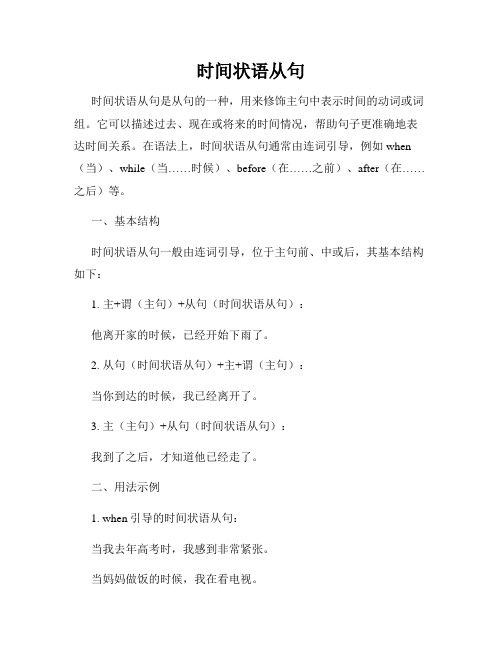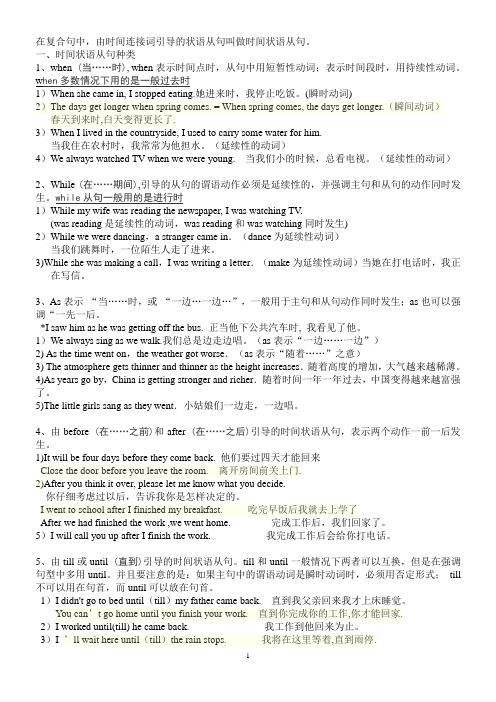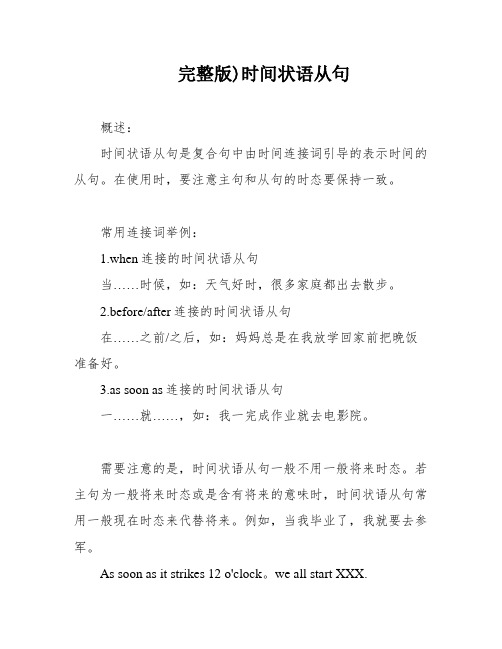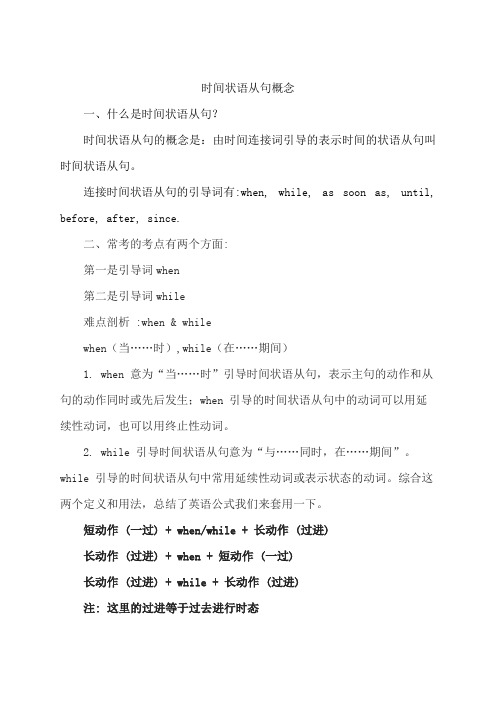时间状语从句
时间状语从句是什么

时间状语从句是什么用作状语的从句叫做状语从句,引导状语从句的关联词是某些从属连词,其在句子的位置可以置于句首、句末或句中,其中时间状语从句是它的一种。
时间状语从句表时间,其关联词有as,after,before,once,since,till,until等。
As the twilight was beginning to fade,we heard the sound of a carriage.当曙光开始消退时,我们听到了一架马车的声响Once you've finished,go to bed.你干完了再去睡觉as,when,while虽都表时间,但是有区别的,as多用于口语,强调“同一时间”或“一先一后”,有时还有“随着”的含义,如As I was going out,it began to rain.当我出门时,开始下雨了(as强调两个动作紧接着发生,不强调开始下雨的特定时间,故须用as而不用when)As spring warms the good earth,all flowers begin to bloom.随着春回大地,百花开始绽放(句中的as也不可代之以when)when则强调“特定时间”,如When he was eating his breakfast,he heard the door bell ring.当他正在用早餐时,听到门铃响了while也表同一时间,其所表的时间不是一点,而是一段,如将上句的when改为while,while从句即强调“他吃早餐”的过程。
一些表时间的副词和短语也可引导时间状语从句I didn't wait a moment,but came immediately you called.我一刻也没等待,你的电话一到我就来了(副词immediately 引导时间状语从句,immediately=as soon as)Next time you come,please bring your composition.你下次来,请把你的作文带来(短语next time引导时间状语从句)时间状语从句中有些成分有时可省略,如Complete your work as soon as possible.要把你的工作尽快完成(as soon as 后省去it is)在时间状语从句中,通常不用将来时,而用现在时来代替,如Be a pupil before you become a teacher.先做学生,再做老师I'll tell her about that when I see her.我见到她时会把这件事告诉她的。
时间状语从句

时间状语从句时间状语从句是从句的一种,用来修饰主句中表示时间的动词或词组。
它可以描述过去、现在或将来的时间情况,帮助句子更准确地表达时间关系。
在语法上,时间状语从句通常由连词引导,例如when (当)、while(当……时候)、before(在……之前)、after(在……之后)等。
一、基本结构时间状语从句一般由连词引导,位于主句前、中或后,其基本结构如下:1. 主+谓(主句)+从句(时间状语从句):他离开家的时候,已经开始下雨了。
2. 从句(时间状语从句)+主+谓(主句):当你到达的时候,我已经离开了。
3. 主(主句)+从句(时间状语从句):我到了之后,才知道他已经走了。
二、用法示例1. when引导的时间状语从句:当我去年高考时,我感到非常紧张。
当妈妈做饭的时候,我在看电视。
2. while引导的时间状语从句:他看电视的时候,我在做作业。
我喜欢唱歌,而他喜欢跳舞的时候,我们常常一起去KTV。
3. before引导的时间状语从句:在开会之前,我们需要准备好所有的文件。
我们应该在出发之前检查好所有的行李。
4. after引导的时间状语从句:他回家后,马上就洗澡了。
我想要再看一会儿电视,之后再睡觉。
三、特殊用法时间状语从句在句子中可以作为主语、宾语、状语、补语等成分的补充。
下面列举了一些特殊用法的示例:1. 时间状语从句作为主语:当你离开的时候,我会很伤心。
在阳光明媚的早晨散步,是一种享受。
2. 时间状语从句作为宾语:我告诉他,当他需要帮助时,可以找我。
现在是回家的时候了,我们应该叫出租车。
3. 时间状语从句作为状语:明天放假,当我们一起去郊游好吗?请把作业做完之后,再看电视。
4. 时间状语从句作为补语:我想知道你准备好出发之后,我们会做什么。
明天要参加考试,当测试结束之后,我们可以一起去吃饭庆祝。
综上所述,时间状语从句在句子中起到了重要的作用,可以帮助我们表达时间关系,使句子更加精确明了。
熟练掌握时间状语从句的用法,对于提高语言表达能力和写作水平都有很大的帮助。
时间状语从句

在复合句中,由时间连接词引导的状语从句叫做时间状语从句。
1)When she came in, I stopped eating.她进来时,我停止吃饭。
(瞬时动词)2)The days get longer when spring comes. = When spring comes, the days get longer.(瞬间动词)春天到来时,白天变得更长了.3)When I lived in the countryside, I used to carry some water for him.当我住在农村时,我常常为他担水。
(延续性的动词)4)We always watched TV when we were young. 当我们小的时候,总看电视。
(延续性的动词)2、While(在……期间),引导的从句的谓语动作必须是延续性的,并强调主句和从句的动作同时发生。
while从句一般用的是进行时1)While my wife was reading the newspaper, I was watching TV.(was reading是延续性的动词,was reading和was watching同时发生)2)While we were dancing,a stranger came in.(dance为延续性动词)当我们跳舞时,一位陌生人走了进来。
3)While she was making a call,I was writing a letter.(make为延续性动词)当她在打电话时,我正在写信。
3、As表示“当……时,或“一边…一边…”,一般用于主句和从句动作同时发生;as也可以强调“一先一后。
*I saw him as he was getting off the bus. 正当他下公共汽车时, 我看见了他。
1)We always sing as we walk.我们总是边走边唱。
时间状语从句

I waited till the rain stopped. 我一直等到雨停。 He didn’t give me the answer until I asked him the second time. 直到我问了第二次,他才回答我 的问题。
1.当某事正在进行的时候,又发生了另一件事, 这时三个词都可以引导时间状语从句。如: As/when/while I was walking down the street, I noticed a police car. 我在街上散步的时候,看到了一辆警车. 2.当两个延续性动作同时进行的时候,最常用 的是while。如: While my mother was cooking,I was doing my homework. 当我妈妈在做饭时,我正在做家庭作业。
As children get older, they become more and more interested in things around them.
随着孩子年龄的增大,他们就会对 他们周围的事情越来越感兴趣。
Mary sings as she works. 玛丽一边唱歌,一边工作。 She looked behind from time to time as she went. 她一边走一边不时地回头看。
D
11. Write to me as soon as you ____ to B Beijing. A. will get B. get C. getting D. got 12.The meeting didn't start ___ B everyone was there. A. because B. until C. why D. if
时间状语从句(完整版)

.. 引导时间状语从句的五类引导词一.引导时间状语从句的从属连词(以下称引导词)很多,为方便记忆,现作以下分类:1. 基本类包括before, after, when, while, as, since, till, until, once, as soon as 等。
如:Did anyone call when I was out? 我不在家时谁来过电话吗?We have known each other since we were children. 我们从小认识。
You’ll feel better after you take the pills. 吃完药丸后你会感到好一些。
Make sure that all the lights are off before you go to bed. 睡觉前一定要关灯。
Don’t promise him anything till we’ve had time to think about it.在我们有时间考虑之前别答应他什么。
2. 名词类即由名词词组充当引导词,包括the moment, the minute, the second, the instant 等(均表示“一……就……”。
如I loved you the instant (that) I saw you. 我一见到你就爱上你了。
Tell me the moment (that) you get the results. 你一拿到结果就给我打电话。
3. 副词类即由副词充当引导词,如immediately, directly, instantly等。
如:I came immediately you called. 你一打电话我就来了。
Directly I walked in the door I smelt smoke. 我一进门就闻到烟味。
4. 短语类主是几个涉及time短语,如every time,each time,(the) next time,any time,the last time,the first time 等。
完整版)时间状语从句

完整版)时间状语从句概述:时间状语从句是复合句中由时间连接词引导的表示时间的从句。
在使用时,要注意主句和从句的时态要保持一致。
常用连接词举例:1.when连接的时间状语从句当……时候,如:天气好时,很多家庭都出去散步。
2.before/after连接的时间状语从句在……之前/之后,如:妈妈总是在我放学回家前把晚饭准备好。
3.as soon as连接的时间状语从句一……就……,如:我一完成作业就去电影院。
需要注意的是,时间状语从句一般不用一般将来时态。
若主句为一般将来时态或是含有将来的意味时,时间状语从句常用一般现在时态来代替将来。
例如,当我毕业了,我就要去参军。
As soon as it strikes 12 o'clock。
we all start XXX.Upon our arrival。
XXX.4.时间状语从句中使用until表示一个动作一直持续到某一时刻,例如:He waited until all the people left。
我们也可以说I didn't go to bed until Mum came back。
表示直到妈妈回家后我才上床睡觉。
5.当while连接时间状语时,表示主句的行为在从句行为过程之中发生。
从句中要使用持续性动词或状态动词,并且持续性动词通常使用进行时态。
例如:While they were waitingfor the New Year。
they listened to music。
sang songs and had fun.Till and until are used to introduce time clauses in affirmative sentences。
with the main clause verb being a continuous n or state that lasts until the time XXX: XXX。
时间状语从句PPT-课件

目录
• 时间状语从句的定义 • 时间状语从句的用法 • 时间状语从句的时态 • 时间状语从句的特殊用法 • 时间状语从句的注意事项
01
时间状语从句的定义
什么是时间状语从句
时间状语从句是用来表示动作或事件发生的时间的从句, 通常放在主句之前或之后,修饰主句中的谓语动词。
时间状语从句通常由连词引导,如when、while、 before、after等。
在某些情况下,过去时间状语从句也可以使用过去进行时态,强调过去某个时间点正在发生的 动作或状态。例如:“When I was walking home, I saw a dog running towards me.”
将来时间状语从句的时态
要点一
将来时间状语从句通常使用一般 将来时态,表示将来某个时间…
在某些情况下,现在时间状语从句也可以使用现 在进行时态,强调正在发生的动作或状态。例如 :“When I am watching TV, my dog comes and sits next to me.”
过去时间状语从句的时态
过去时间状语从句通常使用一般过去时态,表示过去某个时间点或时间段发生的动作或存在的 状态。例如:“When I was young, I loved to play outside.”
01 时间状语从句是主句的时间状语,表示主句动作
发生的时间点或时间段。 02
示例:I will call you when I finish work. (我下 班后会给你打电话。)
时间状语从句中的虚拟语气
在时间状语从句中,有时需要使用虚 拟语气来表示与实际情况相反的情况 。
示例:If I had known the answer, I would have told you. (如果我早知道 答案,我早就告诉你了。)
时间状语从句概念

时间状语从句概念一、什么是时间状语从句?时间状语从句的概念是:由时间连接词引导的表示时间的状语从句叫时间状语从句。
连接时间状语从句的引导词有:when, while, as soon as, until, before, after, since.二、常考的考点有两个方面:第一是引导词when第二是引导词while难点剖析 :when & whilewhen(当……时),while(在……期间)1. when 意为“当……时”引导时间状语从句,表示主句的动作和从句的动作同时或先后发生;when 引导的时间状语从句中的动词可以用延续性动词,也可以用终止性动词。
2. while 引导时间状语从句意为“与……同时,在……期间”。
while 引导的时间状语从句中常用延续性动词或表示状态的动词。
综合这两个定义和用法,总结了英语公式我们来套用一下。
短动作 (一过) + when/while + 长动作 (过进)长动作 (过进) + when + 短动作 (一过)长动作 (过进) + while + 长动作 (过进)注: 这里的过进等于过去进行时态出三个题目来做一下,1 代表when,2代表while.I was playing games ____1____ (when/while) my mom came in.I was playing games ____2____ (when/while) my mom was cooking. My mom came in ___1.2都可___ (when/while) I was playing games. 再来两个例句考证一下:When you are crossing the street, you must be careful.你过马路时,一定要小心They rushed in while we were discussing problems.当我们正在讨论问题时,他们冲了进来。
- 1、下载文档前请自行甄别文档内容的完整性,平台不提供额外的编辑、内容补充、找答案等附加服务。
- 2、"仅部分预览"的文档,不可在线预览部分如存在完整性等问题,可反馈申请退款(可完整预览的文档不适用该条件!)。
- 3、如文档侵犯您的权益,请联系客服反馈,我们会尽快为您处理(人工客服工作时间:9:00-18:30)。
时间状语从句就是在复合句中表示主句动作发生时间的状语从句;时间状语从句是所有状语从句中用得最经常的一种,并且用于引导时间状语从句的引导词也比较多,在学习时间状语从句时最重要的是记住这些引导词有哪些,它们的意思怎样等;到底时间状语从句可以用哪些词来引导呢请看下文:1. 用when引导:when表示“当……时候”;如:Things were different when I was a child. 我小时候情况与现在不同;People breathe more slowly when they are asleep. 人睡觉时呼吸比较缓慢;2. 用while引导:while表示“当……时候”;如:We must strike while the iron is hot. 我们要趁热打铁;I went swimming while the others played tennis. 我去游泳,其余的人都打网球去了;注意:while 所引导的时间状语从句中谓语动词必须是持续性的,不能是短暂性的; 3. 用as引导:as表示“当……时候”“随着”;如:He dropped the glass as he stood up. 他站起来时,把杯子摔了;We get wiser as we get old. 随着年岁的增长,我们也变得聪明些了;4. 用before引导:before表示“在……之前”;如:Turn off the lights before you go to bed. 睡觉前要关灯;Before he went to university he was a worker. 上大学之前他是工人;5. 用after引导:after表示“在……之后”;如:I will tell you after they leave. 他们走我再告诉你;After you finish the letter show it to me.信写完后给我看看;6. 用until / till引导:until / till表示“直到……”;如:He waited until she was about to leave. 他等着一直到她准备离开;I watched him until he disappeared in the distance. 我瞧着他直到他在远处消失;这类句型的主句动词通常只能是,不能是终止性动词;但是,在否定句中,主句动词可以是终止性动词,此时构成not…ntil till…句式,意为“直到……才……”;如:She didn’t marry until she was over fifty. 她直到五十多岁才结婚;We’d better not go until your sister arrives. 我们最好等你姐姐到了再走;7. 用since引导:since表示“自从……以来”;如:We have known each other since we were children. 我们从小认识;They’ve moved twice since they got married. 他们结婚后已搬了两次家;这类句子的主句通常用现在完成时;但是,当主句表示一段时间时,可用一般现在时代替现在完成时;如:It’s a long time since we met last. 好久没见面了;How long is it since you came in London 你来伦敦有多久了8. 用as soon as引导:as soon as表示“一……就……”;如:The boys ran off as soon as we appeared. 我们一来,孩子就都跑了;He started as soon as he received the news. 他一接到消息就出发了;表示“一……就……”这一意思的连词,除as soon as外,还可用the moment, the minute, the instant等;如:I want to see him the minute he arrives. 他一来到我就要见他;The moment I saw him I knew there was no hope. 我一看到他就知道没希望了;9. 用every time等引导:any time, each time, every time, the first time, the last time, the next time等有时也可用连词,引导时间状语从句,分别表示“任何时候”“每次”“第一次”“最后一次”“下次”等;如:You can call me any time you want to. 你随时都可以给我打;Each time I went there, I saw him working. 我每次去那儿都看见他在工作;Every time I call on him, he is out. 我每次去访问他,他都不在;Next time you come in, please close the door. 下次你进来,请关门;10. :当主句为将来时态或含有将来意义时,时间状语从句习惯上要用一般现在时表示将来意义,而不能直接使用将来时态;如:■趁早动手,免得忘了;误:Do it before you will forget.正:Do it before you forget.before引导的时间状语从句不能直接使用将来时态,而通常用现在时表示将来意义;让步状语从句1. 用although / though引导:although与though虽然拼写不同,但意思相同,都表示“虽然”,常可互换;如:Though they are twins, they look entirely different. 他们虽是孪生,但是相貌却完全不同;Although she didn’t say anything I sensed that she didn’t like the idea. 她虽然什么也没说但我已意识到她不喜欢这个主意;注意,不要按汉语习惯说although…but…;如:尽管她父亲在公司里,但她那份工作却是靠自己得到的;误:Although her father is in the firm, but she got the job on her own.正:Although her father is in the firm, she got the job on her own.2. as 作“虽然”解,时,从句中的状语、表语或动词必须置于句首,though 引导的让步状语从句,也可将这些成分置于句首,但although 等其它词引导的让步状语从句不能将这些成分前置;如:Hard as/though they tried =Although/Though they tried hard, they couldn’t make her change her mind. 尽管他们做了很大努力,却没法让她改变主意;时,若提前的是可数名词单数,要省略不定冠词;如:Child as he is, he knows a lot. 虽然他是孩子,但他却很懂事了;3. 用even though / even if引导:even though和even if意思相同,均表示“即使”,常可互换;如:Even though you have a lot of money, I won’t love you. 即使你有很多钱,我也不会爱你;Even if you saw him pick up the money, you can’t be sure he stole it. 就算你看见是他拾起的钱,你也不能肯定钱就是他偷的;4. 用whether…or引导:whether…or…的意思是“无论……还是……”“不管……还是……”;如:I’ll do it whether you like it or not. 不管你是否喜欢,我都要做;Whether we help him or not, he will fail. 不论我们帮助他与否, 他都将失败;5. 用特殊词引导:除上面提到的最常用的引导让步状语从句的词语外,有时还可用那些以-ever结尾的词语来引导,如whatever, whoever, however, whenever, wherever等,它们的意思与no matter what, no matter who, no matter how, no matter when, no matter where等,意思是“无论什么”“无论是谁”“无论多么”“无论什么时候”“无论什么地方”等;如:Whatever you say, I believe you. 无论你说什么,我都相信你;Whoever telephones, tell them I’m out. 不管是谁打,都说我出去了;However much he eats, he never gets fat. 无论他吃多少,他都不发胖;6.另外,还有一个大家比较熟悉的词也可引导,那就是while,它除了表示“当……时候”外,还可表示“尽管”“虽然”,此时引导的是让步状语从句;如:While we don’t agree we continue to be friends. 尽管我们意见不同,我们还是朋友;表示“虽然”的连词不能与表示“但是”的连词but 连用,但可以yet 或still 等副词连用;如:译:虽然当时正下着雨,他还是到那里去了;误:Though it was raining, but he went there.正:Though it was raining, he went there.正:It was raining, but he went there.正:Though it was raining, yet he went there.条件状语从句条件状语从句就是在复合句中表示主句动作发生条件的状语从句;引导最经常用的连词是if,它的意思是“如果”;除此之外,还有其他一些连词,它们也多少含有“如果”的意思,也可用于引导条件状语从句;1. 用if引导:if意为“如果”;如:You can’t take photographs if the light is bad. 光线不足,就无法拍照;If you cheat in the exam you’ll never get away with it. 考试作弊必予追究;2. 用unless引导:unless的意思是“如果不”“除非”;如:Don’t act unless you’re certain. 没有把握就不要做;Unless you go at once you will be late. 如果你不马上走,就会迟到的;3. 用as so long as引导:as so long as的意思是“如果”“只要”;如:I’ll remember that day as long as I live. 只要我活着,我就不会忘记那个日子;You may take my dictionary as long as you don’t keep it too long. 只要使用时间不太长,你可以把我的词典拿去;4. 用in case引导:in case用连词引导条件状语从句时,其意为“如果”“万一”;如:supposing that/provided /providing that假如, in case假使, on condition that在……的条件下等;如:In case I’m late, start without me. 万一我迟到,就不等我了;In case I forget, please remind me about it. 万一我忘记,请提醒我一下;You can learn anything so long as you set your mind to learn it. 用心学本领,总能学到手;I will go there tomorrow unless it rains.=…if it doesn’t rain除非下雨,否则我明天要去那儿;He will do the work providing you pay him. 如果你能付费,他可以做这工作;In case l forget,please remind me about it. 如果我忘了,请提醒我;We’ll let you use the room on condition that you keep it clean and tidy. 我们可以让你使用这个房间,条件是你把它保持整洁;5. :当主句为将来时态或含有将来意义时,条件状语从句习惯上要用一般现在时表示将来意义,而不能直接使用将来时态;如:■不知道明天是否会下雨,但要是下雨的话,我就呆在家里;误:I don’t know if it will rain tomorrow. But if it will rain tomorrow, I’ll stay at home.正:I don’t know if it will rain tomorrow. But if it rains tomorrow, I’ll stay at home.句中的第一个if 引导的是宾语从句if=是否,从句谓语用将来时态表示将来意义;第二个if引导的是条件状语从句if=如果,从句谓语要用一般现在时表示将来意义;但若从句谓语用了will 或would,那will 或would 则是表示“愿意”的;如:If you will go with me, I’ll wa it for you. 如果你愿意等我,我们就帮你做这事儿;目的状语从句目的状语从句就是在复合句中表示主句动作发生目的的状语从句;用于不多,引导的从属连词有so以便, that以便, so that以便,为了, in order that 为了,以便;in case以防,以免, lest免得,以防, 以免,惟恐等;从句中一般含有can, could, may, might, will, would 等;如:1. 用in order that引导:in order that的意思是“为了”;如:He studied hard in order that he could pass the exam. 他努力学习以便能考试及格;He left early in order that he should / would / might arrive on time. 他早早动身好按时到达;该结构有时可与in order to 转换;如:He is working hard in order to pass the examination.=He is working hard in order that he can pass the examination. 为了考试及格,他正在努力学习;2. 用so that引导:so that此时的意思是“以便”;如:Bring it closer that I might see it better. 拿近些,使我能看得清楚些;She burned the letters so that her husband would never read them. 她把信都烧了,这样一来她丈夫就永远看不到了;注意:so that引导目的状语从句与引导结果状语从句时的意思不一样;3. 用in case引导in case以防,以免, lest免得,以防, 以免,惟恐等:I always keep a bottle of wine by in case friends call round. 我平时总存着一瓶酒以备朋友来时喝;It may rain—you’d better take an umbrella just in case it does. 可能会下雨你,最好带把伞,以防万一;注意:in case与引导条件状语从句时的意思不一样;Take the raincoat in case it rains. 带着雨衣, 以防下雨;Be careful lest you fall from that tree. 要当心, 以免从树上摔下来;He walked fast he should be late. 他走得很快,以免迟到;原因状语从句学习指导原因状语从句就是在复合句中表示主句动作发生原因的状语从句;用于引导最常用的连词是because,另外还有as, since以及now that等;1. 用because引导:because是引导原因状语从句最常用的连词,其意为“因为”;如:The little boy was crying because he was lost. 那小孩因迷路而哭;I bought the house simply because it was large. 就是因为这所房子大我才买的;2. 用as引导:as也可以用于引导原因状语从句,意思是“由于”;如:As he is ill, he can’t come to the meeting. 由于生病了,他不能来参加会议;As you weren’t there, I left a message. 由于你不在那儿,我留了个信儿;3. 用since引导:since引导原因状语从句时,意思是“既然”;如:Since you ask, I will tell you. 你既然问,我就告诉你;Since you are going, I will go. 既然你去,我也去;4. 用now that引导:now that的意思也是“既然”;如:Now that you have come you may as well stay. 既然你来了,你就留下;Now that you’re growing up you must learn to stand on your own two feet. 你既然已经长大成人,就得学会独立生活;5. 习惯用法:不要受汉语意思影响将表示“因为”的连词与表示“所以”的so 连用;如:■既然你很忙,那就不必来了;误:As you are busy, so you needn’t come.正:As you are busy, you needn’t come.正:You are busy, so you needn’t come.as是从属连词,在此引导原因状语从句;so 是并列连词,在此连接一个并列句,所以误句结构混乱,应去掉其中一个;结果状语从句结果状语从句就是在复合句中表示主句动作所导致结果的状语从句;用于引导连词也不多,主要的有so that, so…that, such…that等;1. 用so that引导:so that引导结果状语从句时的意思是“结果”“所以”;如:Write out this word ten times so that you learn how to spell it. 把这个字抄写十遍就能记住怎么拼写了;I went to the lecture early so that I got a good seat. 我去听演讲去得很早,所以找了个好座位;2. 用so…that引导:so…that的意思是“如此……以至于……”,其中的so 后接形容词或副词;如:He was so angry that he couldn’t speak. 他气得话都说不出来;He runs so fast that none of us can catch up with him. 他跑得很快,我们没一个能追上他;3. 用such…that引导:such…that…的意思是“如此……以至于……”,其中的such 后接名词名词前通常有形容词修饰;如:It gave him such a shock that his face turned white. 这使他那样震惊,他脸都白了;He is such a clever boy that we all like him. 这个孩子这样聪明,我们都喜欢他;4.Only to doI arrived at the shop only to find I'd left all my money at home. 我到商店却发现钱全放在家里;He lifted a rock only to drop it on his own feet. 他搬起石头砸了自己的脚;She ran to the station that the train had left. 她跑到火车站,但火车却开走了;一、引导比较状语从句的从属连词为as...as和……一样,not as/so...as和……不一样,than比,the more...the more越……越;这类从句常以省略形式出现;如:The work is not so difficult as you imagine. 这工作不像你想像的那么困难;You look younger than you are. 你看上去比你的实际年龄要年轻;The more you study, the more knowledge you can get. 你学的知识越多,你的知识越丰富;He doesn’t work as hard as she does. 他工作不像她那样努力;二、有as正如,as if或as though好像等;如:Do as I told you. 按我告诉你的那样做;As a man lives, so he dies. 正如人能活,也能死;I remember the whole thing as if it happened yesterday. 整个这件事我记得很清楚,就仿佛是昨天发生似的;注:口语中like也可用连词;如:Do it like he does. 照他那样做;She can’t cook like h er mother does. 她菜做得没有她妈那样好;。
